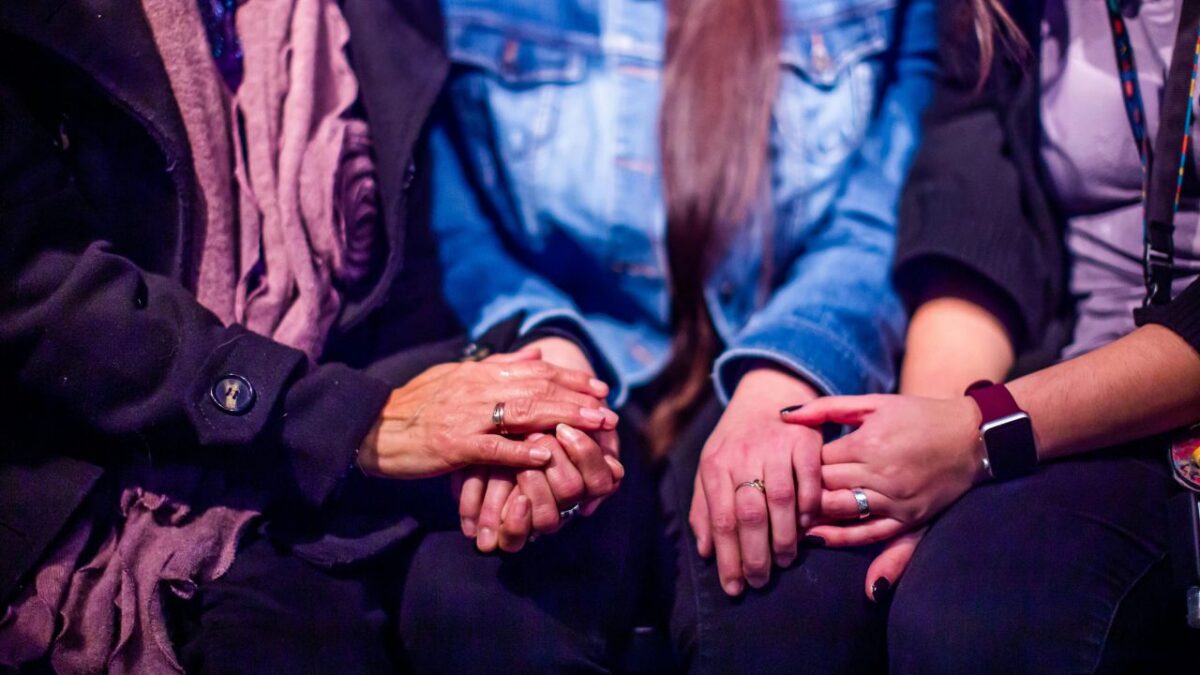
Welcome to the DSA Feed
This is a feed aggregator that collects news and updates from DSA chapters, national working groups and committees, and our publications all in one convenient place. Updated every day at 8AM, 12PM, 4PM, and 8AM UTC.

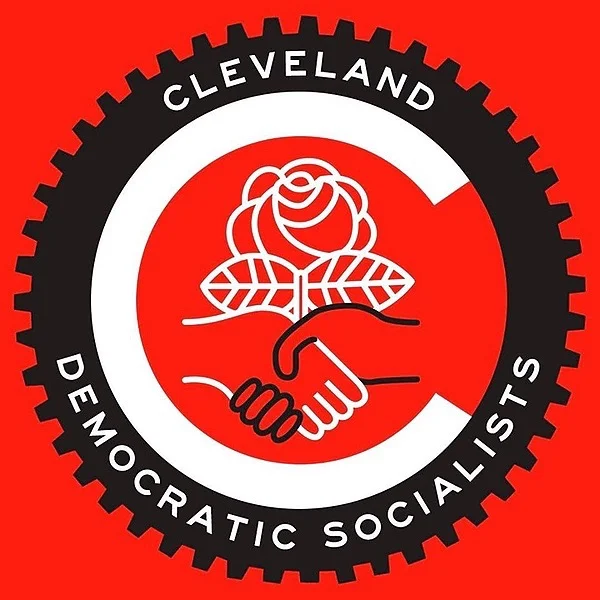

“What is Violence?” by Sarah Selan Highlights the Hypocrisy of the State When Faced With Action
Author: Serge S.
Artwork can carry many meanings. Sarah Selan, the artist behind the recent Cleveland Institute of Art (CIA) exhibition What is Violence?, hopes that people can see the deeper meaning underneath the surface of her paintings and take action to end the genocide in Palestine.
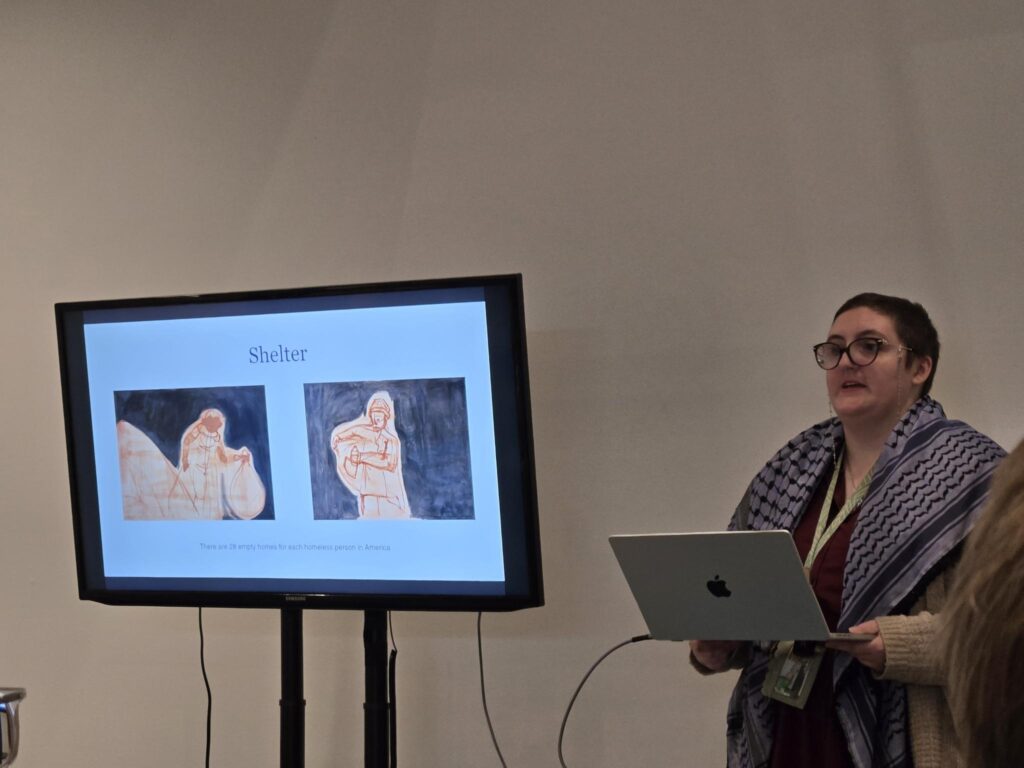
Her paintings consist of saturated dark backgrounds, figures of civilians forming protective barriers against ICE, interference with weapon manufacturers and other actions that highlight state hypocrisy when it labels direct action and peaceful resistance as “violence”.
Selan has personally tasted the arbitrary nature of the government when she was charged, along with ten others, for her alleged involvement in a Nov. 2024 protest. According to the allegations, several buildings and landmarks at Case Western Reserve University (CWRU) were smeared with red paint, including a statue of retired chemistry teacher “Doc Oc.”
The action, which the school claims caused $400,000 in damages, was in response to the CWRU and CIA’s continued work with institutions in the genocidal state of Israel. Students have long demanded the university cut ties with the country.
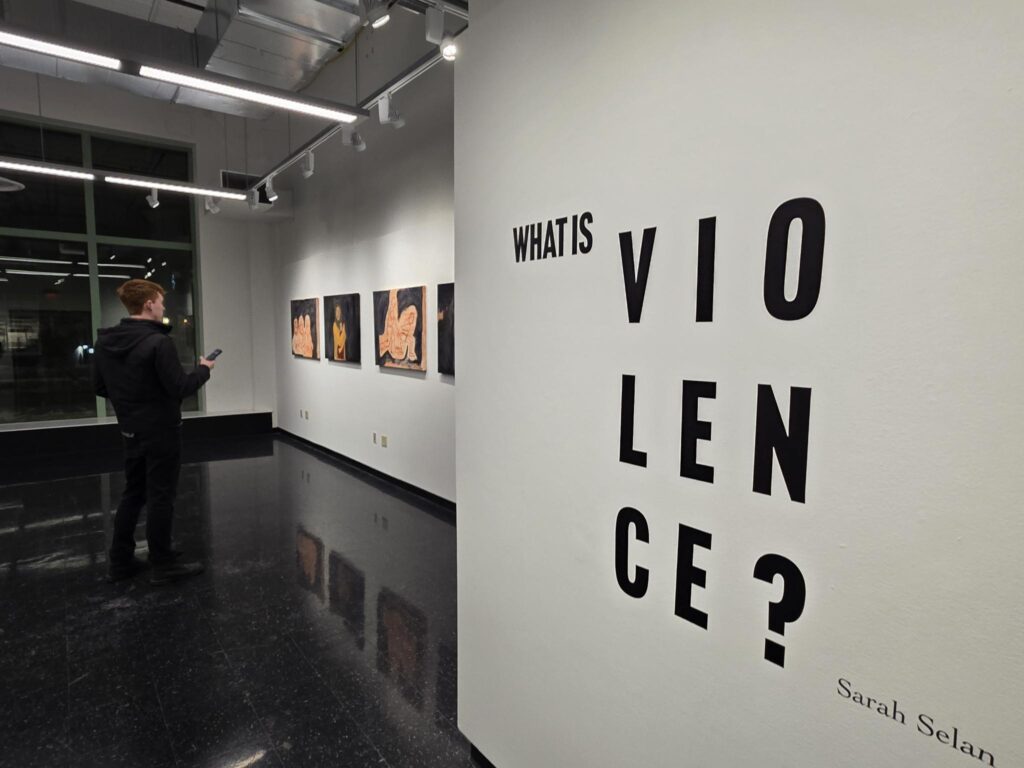
As part of her punishment, Selan was ordered by The Cleveland Institute of Art to show what they categorized as “better” ways of protesting. She did, but she did it in her own style.
“To be frank, the assignment from the school felt a bit condescending,” Selan responded in a written interview. “I was told that I was fighting a good fight, but the way I was fighting is not acceptable. My instructions were to introduce ‘better’ protest ideas from people I do not believe want us to win in the first place. I wanted to use this opportunity to display the difference between peaceful protest and non-disruptive protest. The vandalism was a peaceful protest. Nobody got hurt or was threatened with violence.”
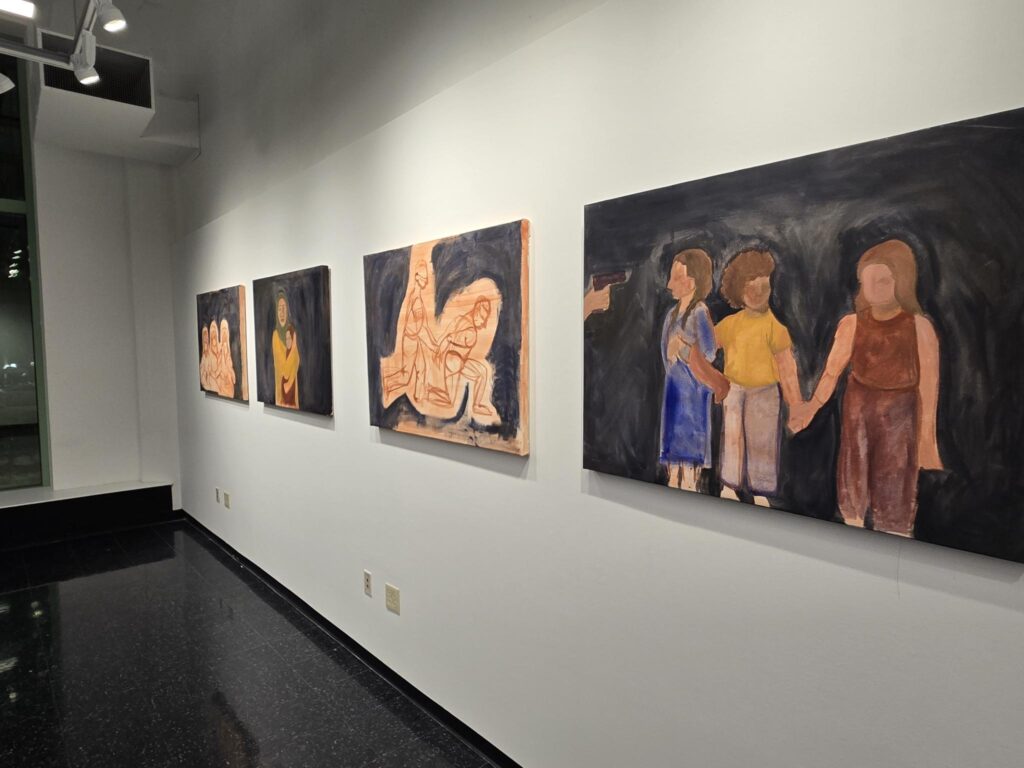
“That being said, it was a disruptive protest,” she added. “People who equate disruption with violence fail to realize that a protest without disruption gives no reason for demands to be met, and no reason for anyone to pay attention to what you are fighting for.”
The paintings remain unfinished. The reason why, Selan said, was to emphasize that the fight for liberation is never over, but also a way to honor the memory of those artists murdered in Palestine by Israel.
“The first is that the revolution is never really over. The fight for global liberation is never really over,” Selan wrote. “We have miles to travel against our oppressors as we work to gain the freedom of ourselves and our neighbors. I wanted to portray that these acts against us are in progress, as are our acts of resistance against them.”
“The second reason was that I often found myself emotionally stuck,” she added. “What right do I have to make art when I should be out fighting? What lottery have I won to find myself in a situation where my punishment for disruption is art while others face death?”
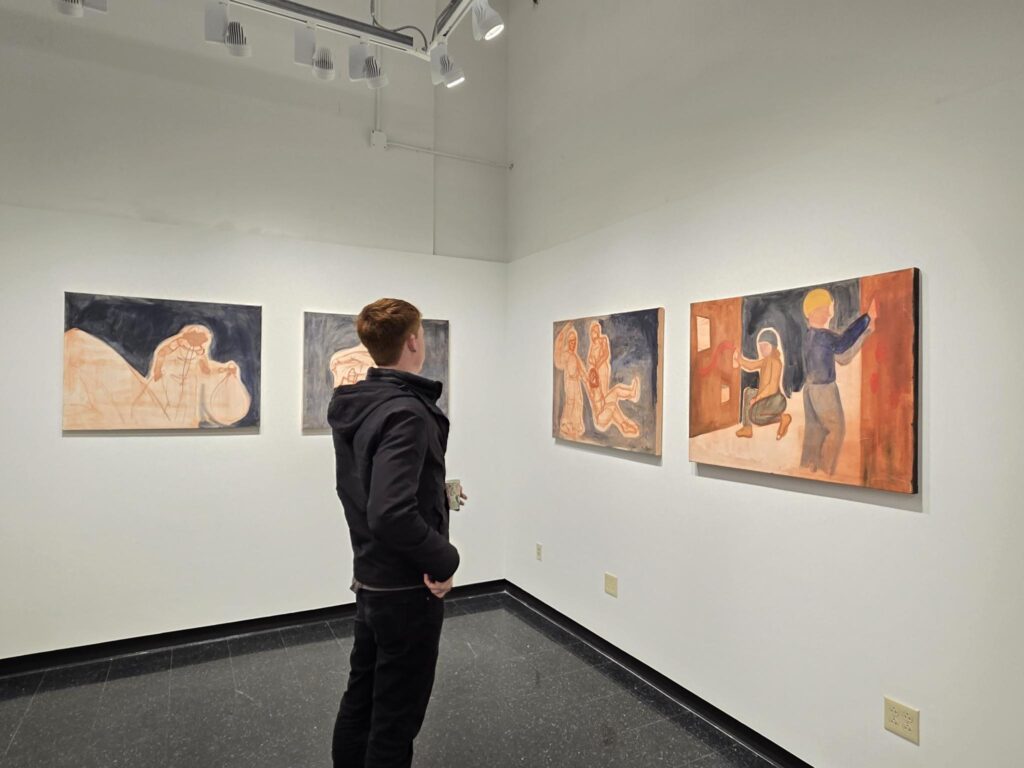
“It was difficult to get the work done in time because I did not deserve the opportunity to make it in the first place,” she concluded. “The greatest artists have been killed by Israel during the genocide. The most creative minds sit in jails and prisons in the United States due to situations outside of their control. To me it serves as a reminder that the best art has never been made because we killed the beautiful people who would have made it.”
Selan said that the school’s reaction to the protest shows the institute’s true stances on human rights, and she hopes that students continue to call for divestment.
“I have no doubt that a day will come in the future where both institutions will boast that their students contributed to an encampment to end the genocide of the Palestinian people,” Selan wrote. “They will use it to draw in future applicants to come be a part of a historic campus with deep roots in liberation.
“They punished the brightest minds their schools have ever seen to promote their beliefs of hatred and bigotry. They work with groups that exterminate an entire group of people just to line their pockets. I condemn their hypocrisy and hope that as students continue to push for divestment, we will transform these institutions into respectful academic organizations that inspire calls for global liberation, instead of suppressing them.”
Selan said that being an organizer as a student comes with its own limitations. When people graduate, movements slow down, and future participants can lose the memory of what worked and what didn’t in previous encampments.
She added that student organizing can only go so far, and for real progress to be made, the skills and experience developed among the encampments need to be put back into the community.
“Student protesters have always been some of the most powerful voices in the activist community,” Selan wrote. “From anti-war movements to civil rights, our students are strong. That being said, we can not put the weight of the revolution on their back.
“I am proud of the students who were able to achieve divestment through their encampments, but that cannot always be the case. There is a lot of pressure to change campuses that have been rooted in imperialism and oppression for decades, but most students will only be around for 4 years. These movements can take decades to achieve change and that can be an overwhelming thought to a lot of young people.”
“Do not take this to mean that campus-based issues aren’t worth fighting for,” she continued. “But rather as a reminder that even if you do not achieve what you hope to in your time at an academic institution, you are making progress towards personal growth and a strong community.”
When asked for her final thoughts, Selan said that her future will be rooted in activism, and in a way, she can thank the state for that.
“The vandalism and my alleged involvement changed my life,” Selan wrote. “I was thrown in jail, received death threats, and was forced to pay for damages that were obviously inflated. Despite all this, I have grown as an organizer and will hold these experiences with me forever. They will inspire not only my art, but everything I do in my life. I am grateful for my journey, and I am right where I want to be.”
The post “What is Violence?” by Sarah Selan Highlights the Hypocrisy of the State When Faced With Action appeared first on Democratic Socialists of America.
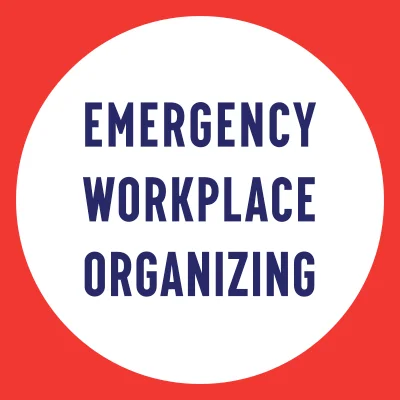

There’s no app for organizing
Developers of a new app called Uniform hope that workers will use it to organize anonymously, but this is not how unions are won.
The post There’s no app for organizing appeared first on EWOC.
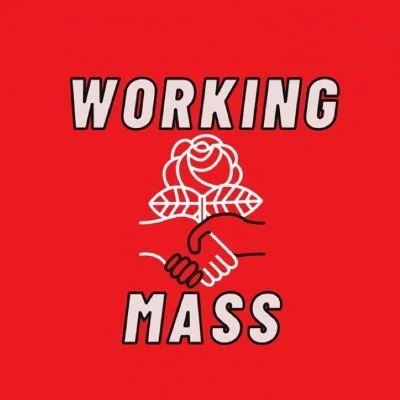
Interview: Lamplighter Brewers Drum Up Community Support Before Union Vote

By: Maritza S
CAMBRIDGE, MA – On February 4, 2026, Lamplighter workers filed for union recognition for their bargaining unit of ~40 rank-and-file encompassing the front of house, production, sales, kitchen, and pepita. They face an imminent election on Friday, February 27, to determine the immediate future through the National Labor Relations Board (NLRB) process after management declined to voluntarily recognize the union.
On February 22, Lamplighter workers drummed up support by inviting their regulars and supporters to a union solidarity day across their two taprooms: a chance to inform community members of the campaign and the union’s oncoming actions.
Lamplighter workers are organizing with Local 1445 of the United Food and Commercial Workers International Union (UFCW), a union of 11,000 in Massachusetts concentrated in the food packaging, grocery, cannabis, and retail industries. Recent UFCW 1445 victories include the 2025 UMass Memorial workers’ ratification of a 3-year contract in Worcester and other shops joining the union’s ranks – particularly in brewing and cannabis.
Working Mass spoke with a worker with Lamplighter Brewing the day before the solidarity day:
WM: When were you hired at Lamplighter?
Gabe (Worker): I was hired in July 2024 I love working at Lamplighter, to be honest – it’s a really great place to work. It’s a really good community. The front of house team is a really lovely team and I’ve recently been working a little bit in production, too, and I like working with those guys as well.

WM: What inspired you to get involved in organizing in the union?
Gabe: It’s just one of those things where we as a team were looking to have a greater say and stake in the business as a whole.
[He paused]
We all really love being a part of the Lamplighter community, and I would say there were some things that we noticed that made us feel like we needed to collectively bargain in order to have a more secure future at Lamplighter as it grows and develop and grow and develop together.
WM: What were the top demands or issues that you and your coworkers experienced?
Gabe: I think demands around job security and then also better benefits and of course, more secure and better pay.
WM: How did management respond to the unionizing? Have you faced retaliation?
Gabe: Of course, they declined to voluntarily recognize our union so we will be going to an election and have stated they do not believe that unionization is a good fit, as they described it, for Lamplighter. So I would describe their response as, I would say, negative.
WM: What is the best case scenario of victory? What does that look like?
Gabe: For me, the best case scenario is a situation where all of the workers at Lamplighter feel they can work without worrying about their job security or how they’re going to pay bills.
This dream is a shared one, but evidently opposed by management.
The February 22 solidarity day at Lamplighter Brewing Co. drove up customer awareness of the union through both passersby and activation of relational networks. More and more people become aware of the union and thus are likely to act in solidarity with workers during moments of higher confrontation during the union election process.
The support of the community is key to the organizing drive at Lamplighter. They have also asked for supporters to leave reviews shouting out the union as they move towards election on Friday, February 27.
Maritza S is a contributing writer to Working Mass.

The post Interview: Lamplighter Brewers Drum Up Community Support Before Union Vote appeared first on Working Mass.
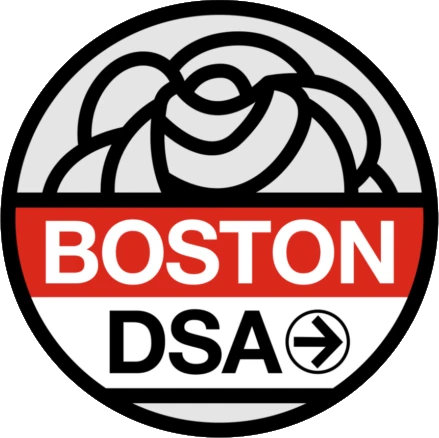

To Call Allston Home

Article on The Crimson’s website: https://www.thecrimson.com/article/2025/4/4/allston-transience-scrutiny/
Repost from The Crimson, April 4 2025, title image credits to Joanna Lin.
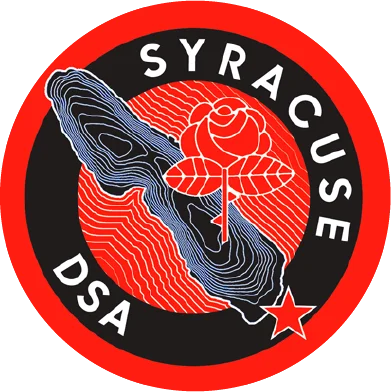

Syracuse DSA: The Affordability Slate!

📢 Big news, #Syracuse: We're officially launching The Affordability Slate! ✴️Tammy Honeywell ✴️Jo Bennett ✴️Maurice Brown Jointly endorsed by @nywfp.bsky.social, they’re committed to fighting for a working-class platform: 🏠 Truly affordable housing 👶 Universal childcare 🚌 Expanded transit access


On Interest Rates and Central Banks
by Skye Winspur
I want to make the case that democratic socialists should care about interest rates set by central banks. While I do not worship capitalism, or trust the stock market at all, I do see the value to our society in having central banks. The US Federal Reserve was created, as almost all the US government’s “deep state” institutions have been – Social Security, the Federal Deposit Insurance Corporation, and Medicare are other examples – as a response to repeated failures of capitalism. Financial panics in 1857, 1873, 1893 and 1907 were distressing enough to the investor class, not to mention ruinous to many workers, that in 1913 they pushed Congress and President Wilson to create a central coordinating institution for banking. The wisdom of not tying the value of money to shiny metallic elements would have to wait about sixty more years.
Apparently one thing Jeffrey Epstein believed strongly in was the virtue of negative interest rates. And for quite a while, the world was accommodating to him in this regard as in others, with the Federal Reserve under Ben Bernanke embracing a zero-interest-rate philosophy, and the central bank of Japan wedded to it for an even longer stretch (raising interest rates barely above zero only in March 2024). I turned 26 years old in 2008 and I remember how we were all told (by Bernanke and Larry Summers and every other Wall Street man) that slashing interest rates would “stabilize the economy,” create jobs jobs jobs, encourage every poor striving youngster to take entrepreneurial risks, cure cancer faster … What it actually did do, unquestionably, was stimulate the construction of new coal plants, usually in the Global South; encourage predatory subprime lending to people whose incomes were very precarious (the subprime rate always being substantially higher than the central bank one); and generally enable already mega-rich men to embark on vainglorious capital-intensive boondoggles that caused harm to the environment and surrounding communities (like Elon Musk’s “city” complex Starbase, which the Obama-era EPA could probably have done something about if it really wanted to). Because as soon as interest rates fall below zero, it is more profitable to spend one’s money on anything at all than store it in the bank. Of course, paying one’s workers more rarely if ever spontaneously enters the thoughts of those possessing this money, despite some economists’ claims that wage increases are “organic” or “natural” in a growing economy.
Morally speaking – and this may just be my inherited Scottish thrift speaking – I feel that saving is not the same as hoarding. Still, I also feel that wealth inequality has reached hyper-outrageous levels. Therefore, I think a wealth tax on all assets above $50 million, as Saikat Chakrabarti has proposed, is absolutely justified. I also think raising the FDIC insurance cap on deposits to half a million dollars is a very good idea, because young adults should be able to save up for homeownership in Dane County with one bank account without fear of bank failure during the next panic. The problem here is that if interest rates on CD savings accounts are zero or even less than one percent, as Kevin Warsh appears to want to push for with all the fervor of a recent convert to Trumpist orthodoxy, there is little to no financial incentive to save the sums required for a house or any similarly large purchase. Young people may even be (more) tempted to sign up for ICE or CBP and grab a quick signing bonus, hoping that they will not be asked to do anything too atrocious in the next three years. Quite a way to compound the systemic evil of the carceral state.
I am not a Marxist and I do not believe in a final, total abolition of capitalism. I think if we are going to have a central bank like the Fed (and despite the paranoid rantings of Rand Paul-aligned libertarians, I think we should) it should maintain a robust interest rate, not so high as to make borrowing impossible but not so low as to promote the creation of Starbases and Fyre Festivals and other spectacular wastes of financial resources – and no, the money Netflix made off the Fyre Festival documentary does not redeem that project. The evil of capitalism cannot be changed by loosening regulations, refusing to use preferred pronouns, or cutting borrowing costs – this is the false promise of which Trump is always trotting out new variations – it can only be reduced, and reduced very substantially, by strong enforcement of an equitable rule of law and applying brakes in the form of central bank monetary policies. To my mind, keeping interest rates well above zero is one of those brakes.
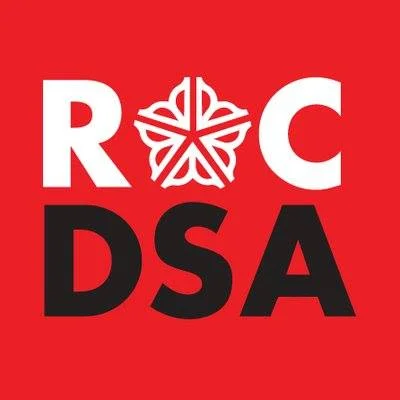
On Legitimate Resistance and Acceptable Tactics
by Paul Allen
With the genocide in Gaza recently reaching its second year, and with the “ceasefire” agreement allowing for ongoing mass murder on the part of the IOF, I’ve been pondering recently how we discuss the role of Hamas, and just how we can best classify them in the political context. To set some facts straight to start: they are the central state actor in Gaza; their antidemocratic hold on power aside, their military wing is only a part of an organization that runs the civil institutions as well, the hospitals, universities, supply lines, transportation networks, and disaster response infrastructure that Israel has repeatedly bombed.
It’s entirely accurate to say that Hamas is a “resistance movement”, in that they are an organized force working to impede the actions of a stronger occupying force in a specific geographic area (a simple definition, but I think effective). Some prefer to use the term “terrorist movement” as well, something which is not mutually exclusive with a resistance movement, but which is used to obscuring effect by Israel’s defenders. While many of the accusations levied against Hamas are fabricated and embellished, one cannot deny the large death toll among the civilian Israeli population on October 7. The targeting of civilians is always a war crime, no matter the context, which would make the individuals carrying out these actions war criminals, despite any Israeli actions before or since.
Where this gets even more complicated, though, is the fact that war crimes like those from 10/07 are almost universal to military action from any force, both modern and historical (the firebombing of Tokyo in 1945, the Sullivan Expedition of 1779, the use of depleted uranium in Iraq in 2003, the list goes on). That’s not to excuse it either, but just to say that terrorism and war crimes do not delegitimize a group’s claim to statehood. No one would argue that the US, despite its multitude of sins, isn’t a sovereign state actor. The statehood of Israel exists alongside its history of apartheid, colonialism, and genocide. On the large scale, Israel has no right to exist in Palestine, simply because there was already a people and de facto country already there in 1947 (Ottoman and later British occupation do not delegitimize this fact any more than the Zionist presence at any point in history). The fact that the US, Israel, and Hamas all provide civil services and have non-military wings shows this even further. It is unique to the case of Palestinians that accusations of terrorism by its military actors are used to deny their claims to self-determination outright.
When someone asks, “is Hamas a terrorist organization”, the only way that an answer of “yes” is incorrect is that it doesn’t tell the whole story. Yes, but not to the degree of the US and Israel. Yes, in that it has used terror tactics in the pursuit of its legitimate and justifiable aim of freedom from Zionist occupation (certainly less condemnable than the imperialistic aims of the US and Israel). Yes, as much as George Washington, David Ben Gurion, Oliver Cromwell, Fidel Castro, William T. Sherman, or Dwight Eisenhower ever were; founders, defenders, challengers to the status quo. It doesn’t make it right to commit war crimes, even in the face of genocide, but it also doesn’t excuse the same or delegitimize the struggle of the oppressed.
The post On Legitimate Resistance and Acceptable Tactics first appeared on Rochester Red Star.



